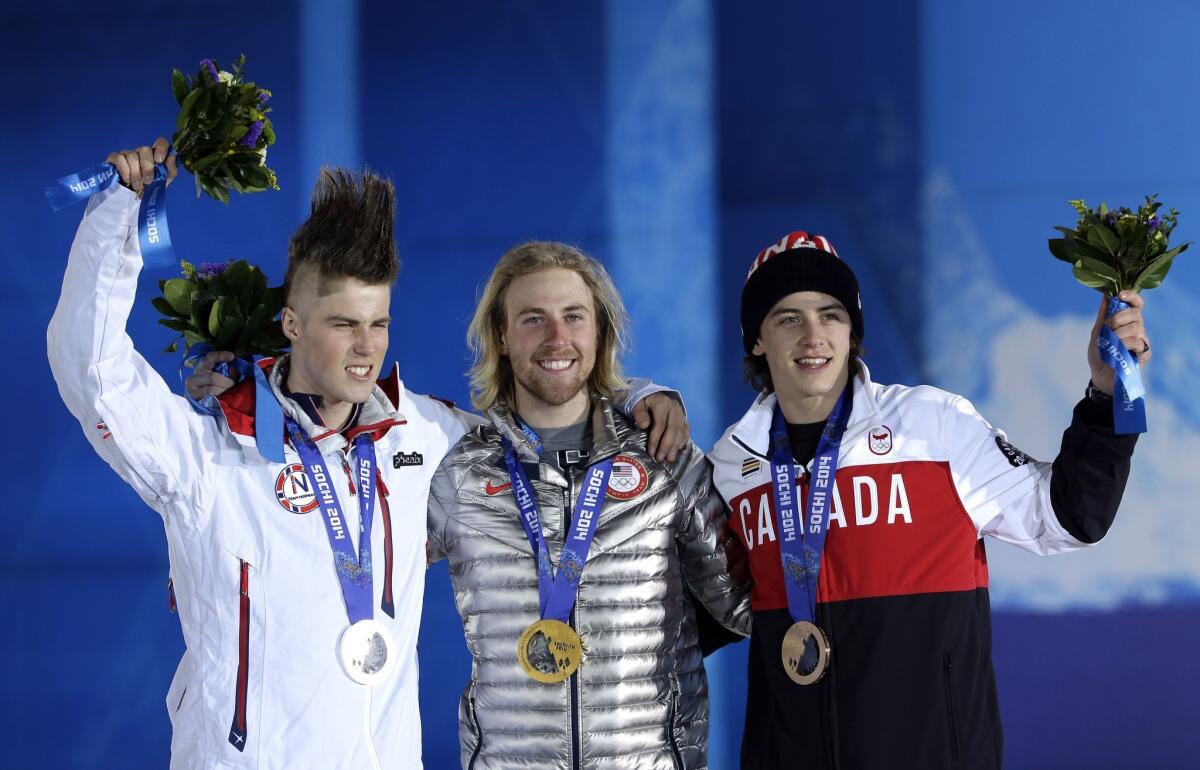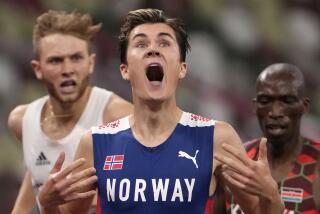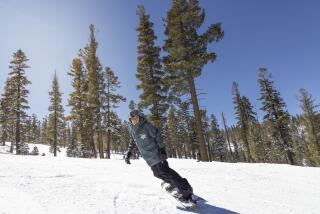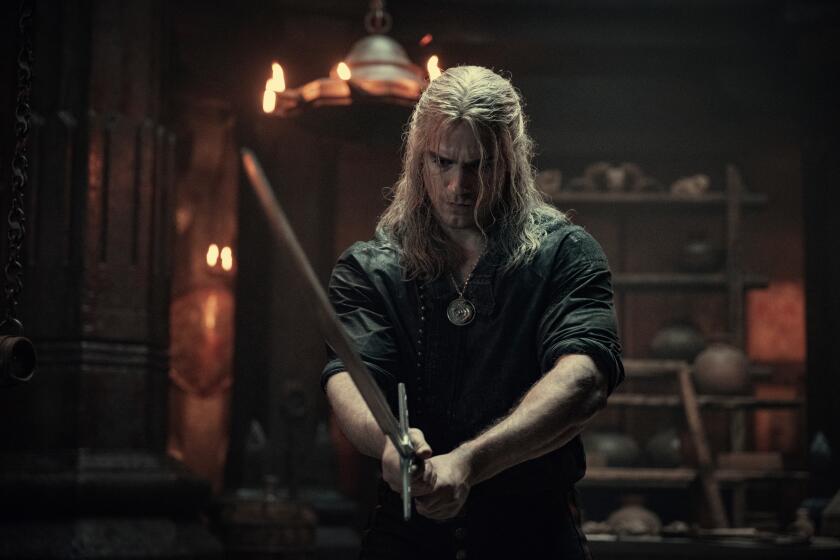Sochi Olympics: TV makes slopestyle a uniquely 21st century event

If you’re launching a new sport in this country and hope people will watch, there’s one thing you definitely don’t want: its biggest potential star to drop out just before the competition begins.
And there’s one thing you definitely do want: big wins from charismatic Americans.
Slopestyle, the new sport that sounds like a rapper and looks like a mountainside version of your local mall parking lot, managed both at the Sochi Olympics.
As NBC has tried to drum up interest in the new event, it has ridden ups and downs as steep and unpredictable as those in slopestyle itself. Last week, just a few days before the event was to make its Olympic debut, Shaun White announced he was withdrawing, citing injury concerns. Not great given: (a) White’s outsize profile and (b) slopestyle’s utter lack of profile.
But over the weekend, Americans went on to dominate on both the men and women’s sides -- a dark horse (Park City, Utah, native Sage Kotsenburg, a dude who most certainly abides) and a favorite (Jamie Anderson of South Lake Tahoe, Calif.).
PHOTOS: Winter Olympics in film
Kotsenburg’s win was especially notable -- he did it while breaking all the rules, trying tricks that not only the judges haven’t seen but that he’s never tried. (This piece explains it nicely.)
More important than their golds, though, was how the athletes carried themselves after their victories -- or their losses. Snowboarders are typically a loose bunch. But their portrayals in these broadcasts made White look like an accountant.
Kotsenburg was doing the run while, well, we’ll let commentator Todd Harris explain. “He’s chewing gum in the [last run] of the final,” the analyst mused, in something that sounded like a play call out of “The Naked Gun.” Most athletes are asked in a post-game interview what was going through their minds. Kotsenburg should have been asked what was going through his mouth.
(Incidentally, what was going through his mind was ... not much. When asked about the run, Kotsenburg had this to say. “I’ve never even tried the trick I tried on the bottom jump. I pulled it out of the bag,” he said, spacily. “I landed, I was like, ‘What just happened?’ I blacked out in the air.” You put this dialogue in a Coen brothers movie and a studio executive would nix it for a lack of realism.)
Even the losers seemed enthusiastic. Mark McMorris, the Canadian gold-medal favorite who pulled off the most technically proficient run before learning the hard way that the judges were looking for spontaneity, kept his spirits high when he landed only a bronze.
PHOTOS: Sochi Olympics Opening Ceremony
“True happiness right now,” he said. “I’m a ball of emotion.” This after he hugged and tackled his opponent in celebration. It would be like Peyton Manning taking Russell Wilson’s hands after the Super Bowl to do the hora.
The women’s competition was similarly what-me-worry. Upon boarding mediocre runs, several competitors smiled and turned their palms up at the bottom of the mountain in a cheerful what-can-you-do pose? After a weak run, American hopeful Jessika Jenson took stock of the moment by calling out “I heart Idaho.”
And then there was Anderson. NBC producers knew a good thing when they saw it -- they didn’t even bother with the second half of the final boarder’s run when it became clear she couldn’t catch the American. “Mother Russia meet your new Olympic champion,” commentator Todd Richards exclaimed, citing “the golden girl from South Lake Tahoe.”
Then the newly minted medalist, as unprepossessed in front a camera as one can be, began shaking her snowboard in some kind of interpretative dance. At one point she even seemed to bow down to it.
What made this all the more enjoyable was how it contrasted with a time-honored TV sport. In the slice-and-dice world of NBC prime time, slopestyle on Sunday night was alternating with figure skating. It was a far different story there, where the smiles were so tight they were tighter than the outfits, and the outfits weren’t exactly cargo pants. As the commentators talked about “joyous” routines and skaters like U.S. comer Gracie Gold described all the “fun” she was having, you couldn’t help but think: Are you talking about slopestyle? Because those guys are having fun. You guys are forcing smiles and doing triple axels to orchestral music.
WINTER TV PREVIEW: Full coverage of the season’s shows
Yes, I know all the laments about the X-Games-ification of the Olympics. And certainly there are moments when the board-grabbing and 1020-performing and amplitude-exclaiming looks more like a Saturday afternoon on ESPN2 than the world’s grandest sports stage. But the sheer exultation of that event can make it more exciting than a hundred free skates. It also makes an interesting statement in this era of the train-16-hours-a-day, professionalized Olympics--namely, that doing something well and often doesn’t mean you have to be such a grim automaton.
Besides, the slopestyling of the Olympics is culturally in tune. The Cold War solemnity of the Games is over. Why not some joyful, cross-cultural spontaneity.
So how popular can a newbie sport like slopestyle become? Like a lot of debut events, it will depend on how much coverage networks give it and what kind of profile these stars have once the Olympics die down. Certainly the building blocks are there, though. There are likable, devil-may-care personalities. And with its soaring jumps against a backdrop of panoramic mountains, slopestyle is practically made for TV.
The best part, as with a lot of young events, is that the sport itself is evolving. If you tuned in to Sochi slopestyle it looked different than X-Games slopestyle, and if you tune in to the Pyeongchang Olympics in 2018 it may well look different than Sochi. “Progression, progression, progression,” McMorris said. “Everything in the world progresses, so if you don’t keep pushing you’ll be laughing.” Or maybe he said “lagging.” Either way. For slopestylers, these serious words don’t really matter. Neither does seriousness itself.
[Note: This is part of an ongoing series documenting the Sochi Olympics from a TV perspective. Every morning of the Games, we’ll look at a key moment from the previous day that NBC captured, elevated, honored, bungled or otherwise reported in a notable way, as only the most televised event on the planet can be covered.]
ALSO:
Sochi Olympics TV moment: NBC’s Hannah Kearney challenge
Sochi Olympics: How NBC muffed Bach, Daft Punk (and why it matters)
Sochi Olympics opening ceremony moment: Egghead history, Daft Punk
Follow me on Twitter @ZeitchikLAT
More to Read
The complete guide to home viewing
Get Screen Gab for everything about the TV shows and streaming movies everyone’s talking about.
You may occasionally receive promotional content from the Los Angeles Times.







